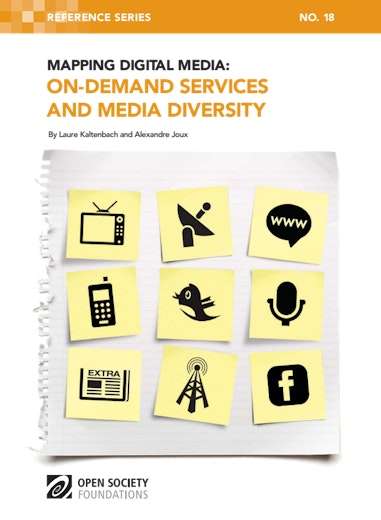The Mapping Digital Media project examines the global opportunities and risks created by the transition from traditional to digital media. Covering 60 countries, the project examines how these changes affect the core democratic service that any media system should provide: news about political, economic, and social affairs.
On-demand services give access by internet (or cable) to video, audio, and other content. A vast range of on-demand media products is now available. Media corporations no longer monopolize the routes by which content comes to thrive in the on-demand world. Social networks, YouTube, and word of mouth all play their part. While content creators saw their market share rise between 2000 and 2009 from 12 percent to 13 percent of the total, the publishers’ share fell from 71 percent to 48 percent and the distributors’ share rose from 17 percent to 39 percent.
The new pairing of high-tech gadgets with internet services is becoming the gateway to content on demand. The “broadcasters” on the internet—Apple, Sony, Amazon, and so on—are both device manufacturers and online service providers. The content available via their platforms will draw in the consumers of on-demand media. The influence of on-demand services is likely to increase as internet-connected television sets become more common. Online services are all about technical competence, not social responsibility. They leave internet users to decide what deserves to be read, viewed, and heard. This freedom is exercised in the context of heavily personalized catalogs, reflecting users’ wishes and histories.
As well as furthering the exploitation of “tribal” consumer niches, however, on-demand services have the potential to help people discover what they don’t already know. If this potential is to be realized, “sociability” will have to become “conviviality”—and the providers may have to accept public service obligations of some kind.
Download
-
Mapping Digital Media: Reference Series: On-Demand Services and Media Diversity (201.3 Kb pdf file)
Download the complete 20-page report.
Read more
Voices
What Does Independent Journalism Look Like in the Digital Age?

Journalists and media organizations can find themselves repressed because of inadequate or deliberately repressive policy. Mapping Digital Media examines the situation in 56 countries.
Voices
Does Digital Media Mean Better Media?
From Montenegro to Nicaragua to China to Egypt, has digital media improved access to good-quality journalism?
Voices
Early Days for Digital Media in Morocco
Digital media in Morocco continues to advance. With 105 percent mobile phone penetration in the country and a growing appetite for online news more change is on the way.
